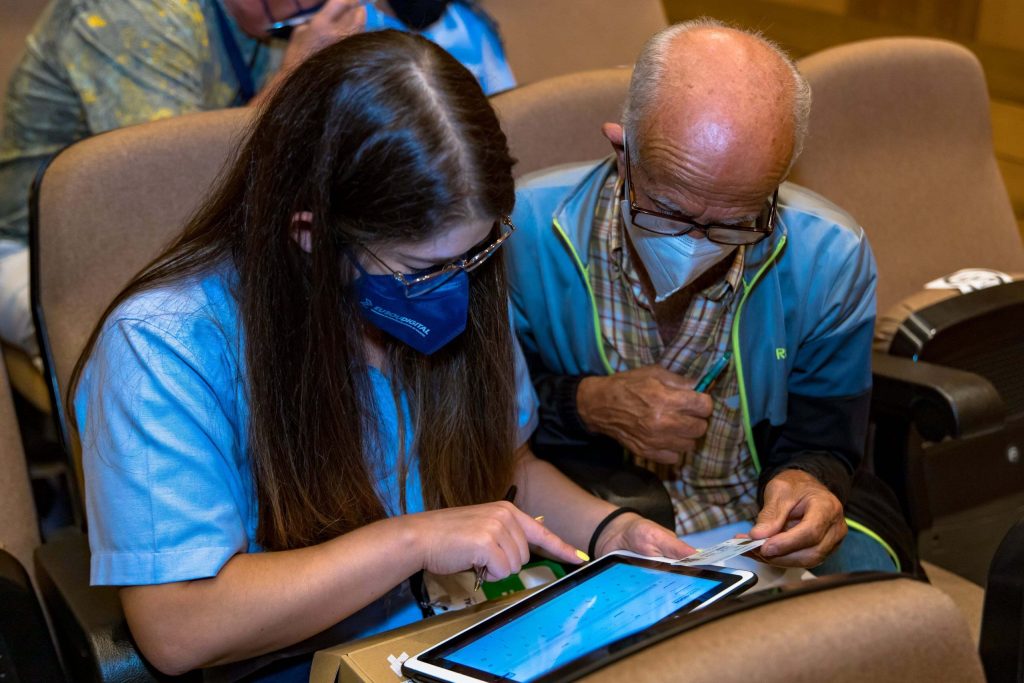The possibilities of democracy technology
Valongo’s efforts to foster social cohesion, community engagement and digital literacy have been nine years in the making. What started as a push for more direct citizen involvement in the form of participatory budgeting has now developed into ‘Switch to Innovation’, an umbrella programme running the city’s 25 initiatives. The programme pushes for a more autonomous and resilient community, by means of social innovation, and is also a finalist in the 2023 Innovation in Politics Awards.
The programme’s foundation is technology, of which Mayor Ribeiro emphasises the potential to “make a positive impact on the local community and offer opportunities to empower different groups of [Valongo’s] population.” By showing its citizens the possibilities technology offers to help them become more engaged, digitally literate citizens can then access and develop new ways to engage with the city and participate in decision-making processes.
Digital Citizen Centres, as one example of the programme in practice, are a place where people can learn how to use technology to realise a project. “If somebody wanted to create an app to solve a problem in the city, they could come and learn the whole process. From how to build the app to what to advertise,” Mayor Ribeiro explains.
Another project, ASA 4.0, empowers elderly people to learn digital skills. This purpose being to combat the increasing exclusion they face due to rapid technological advances.
Next to increasing digital literacy, Switch to Innovation also shows Valongo’s citizens that participation is possible on a day-to-day basis. The projects offer opportunities for citizens to become involved at many different levels – from having citizens decide which books to store in the local library to youth participatory budgeting.
Engaging the community for a resilient democracy
Mayor Ribeiro’s dedication to the Switch to Innovation programme comes from a concern for democracy: “Democracy is under attack in many areas. Often, from within democracy itself,” he says. The Mayor believes that the best way to withstand threats to democratic freedom and autonomy is to build a resilient community. “If our community has the knowledge and tools to educate themselves, they are much more capable of participating in democratic processes and withstanding threats to democracy. […] An enlightened community is a participative community.”
Another integral part of a healthy, participative community is social cohesion. Accordingly, Mayor Ribeiro is particularly proud of the projects that improve community relations. For example, the city has been implementing projects in which young people and seniors cooperate towards a common goal to foster intergenerational cooperation. “Normally, it is very rare that people from different age groups interact with each other. A young boy may not talk to his elderly neighbour, which isolates citizens from each other and is counterproductive to a democratic community,” Mayor Ribeiro says.
An exercise in consistency and dedication
Switch to Innovation has required a lot of resources over the years – time, attention, money – and much of the financial resources have come from taxpayers, as the city does not rely on external funding. Here, Mayor Ribeiro emphasises the importance of prioritising the project. “Dedicating a part of the city’s budget to this cause shows how important it is to us,” he notes. The key to success, he underlines, has always been consistency. “What we do may look easy now because we have been working on it for so long, but it is difficult.”
As the municipality of Valongo has learned, changing people’s habits over time requires consistently implementing new ideas and learning from mistakes. For this reason, the city committed to keeping the initiative going for an extended period of time – even if a project gets less attention than others or takes up resources. To achieve this, the city cooperates with external and internal partners to make the projects the best they can be. For the Digital Citizen Centres, Valongo’s partnership with the NGO Center for Digital Inclusion (CDI) has been essential.
Innovation for the long-term
Implementing Switch to Innovation has also required patience and flexibility, as some projects have changed over time. For example, the youth participatory budgeting project has recently introduced a requirement for the participants to be library members. “We want people to be informed. If they have a library card, the likelihood that they will read a book is higher than if they don’t. That is the simple consideration behind this change.”
Changes the city makes to the projects are open to debate and differences. They are as much part of the participatory process as the opportunities the projects provide. When adapting the Switch to Innovation projects, Mayor Ribeiro emphasises the importance of honest dialogue with Valongo’s citizens. “I am not here to teach the citizens about the right thing to do.”
For Valongo’s Mayor, the goal is to continue with Switch to Innovation – to grow the projects and increase solidarity amongst Valongo’s citizens. “The great thing about being mayor is that you get to inspire the people you work for. You get to create opportunities, open doors, point the way”, Mayor Ribeiro says. “As long as I am mayor, I strive to inspire change.”
